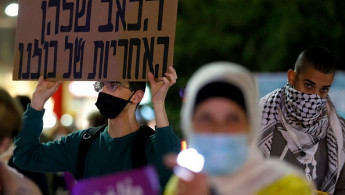Two more Palestinian citizens of Israel killed as crime spike continues
Two more Palestinian citizens of Israel have fallen victim to a deadly spike in crime that has killed almost 200 others so far in 2023.
The recent casualties, 70-year-old Eid Abu Hassan Al-Ziyaddin and another unidentified 20-year-old man were killed by shootings which were not connected.
The incidents took place within hours of each other on Thursday, news site The Times of Israel reported.
Al-Ziyaddin was semiconscious when paramedics found him in southern Israel but he was pronounced dead at a hospital in the city of Beersheva.
Initial police findings connected the episode to an internal clan conflict.
The 70-year-old had been scheduled to attend a reconciliation, or "sulha", event on Friday.
The 20-year-old man passed away after being taken from Fureidis, a Palestinian-populated town in Haifa District, to a hospital in the city of Hadera.
The killings bring the number of Palestinian citizens of Israel killed in local violence so far this year to 190 - more than twice the number in the same window last year, according to the Abraham Initiatives organisation.
The slayings came as demonstrators dyed a well-known fountain in Tel Aviv red in opposition to a sluggish government response to the spike in crime affecting Palestinian citizens.
פעילי מחאה צבעו את מי המזרקה בכיכר דיזנגוף באדום: "188 נרצחים - יש כאן תוכנית סדורה לריסוק החברה הערבית"https://t.co/GYHVAPzZCl pic.twitter.com/9h4Q2eSwIY
— החדשות - N12 (@N12News) September 28, 2023
The NGO Standing Together said: "It is impossible to remain silent when the blood of the victims of crime in Arab society keeps on being spilt."
The finger has been pointed at criminal organisations over the spike in crime.
Most of Israel's Palestinian citizens are descendants of Palestinians who survived ethnic cleansing and mass displacement by Zionist militias which accompanied the establishment of the Israeli state in 1948. They make up about a fifth of Israel's population.
They have for decades faced high poverty rates, poorly funded schools, and overcrowded towns lacking services, and say they are treated as second-class citizens compared with other Israeli citizens.





 Follow the Middle East's top stories in English at The New Arab on Google News
Follow the Middle East's top stories in English at The New Arab on Google News


